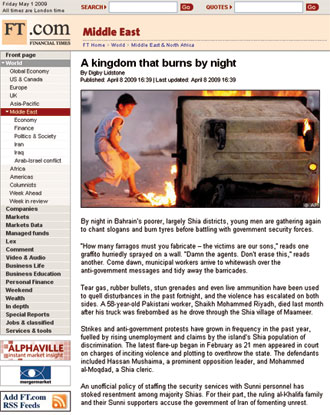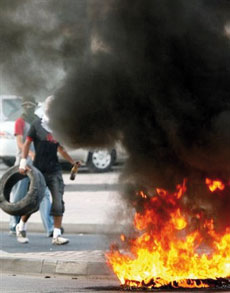Foreign Media Coverage of the Violence in Bahrain
The recent violence and riots in Bahrain, particularly during
the last few months, have attracted the attention of foreign media
both inside and outside the country, especially with the presence
of foreign correspondents and several press offices working in the
capital city Al Manama. Hot news inevitably draws media attention,
therefore, news agencies, newspapers and TV channels were all quick
to cover the story, and according to some journalists, the attention
given to the issue by far exceeded what it actually deserved.
This is not the subject of debate here, rather the nature of
the media coverage itself and by prominent and well established
media institutions such as Reuters, the Financial Times, the BBC
and the Economist among others. In general, this foreign media coverage
resulted in many errors and exaggerations, and negatively impacted
the already heated local situation. As the situation has calmed
down significantly, it is now possible to discuss and analyze the
media coverage and its outcome in the following points:
In analyzing the event:
- Media coverage focused on the events as part of ‘a
sectarian conflict’ between the Shia majority and the Sunni
minority, and sometimes between the royal family and the Shia
population or between a Shia group and a fundamentalist Sunni
one. It is obvious that this kind of analysis is inaccurate,
for those who incited the riots were just a minority, however
loud their voices were and despite the fact that they practiced
their activities under the banner of ‘Shia demands’. Even if
these demands were legitimate, the way in which they were expressed
was not directed towards Sunnis. In fact, the recent unrest
was aimed at the Government and all its institutions, as advocates
of violence in the streets did not show any consideration either
to the law or to the Government and its institutions. This means
that the unrest that occurred was a form of politicized violence
and did not constitute a ‘sectarian conflict’, rather it was
an attempt to achieve political objectives using illegal means.
- Foreign media coverage also gave the impression that
the minority who were at the centre of the events represented
the majority of Bahraini citizens. This claim is still being
said by the leaders of some groups to show that their demands
were that of the majority of the people in the country. Here,
the media also made another error, as although there is almost
a unanimous agreement on certain demands, there are also different
opinions on the best way to achieve these demands. The majority
stresses the use of legitimate and peaceful means, while the
minority only believes in the use of violence and rioting. Moreover,
there are some demands that are limited to radical groups only
such as the call to overthrow the royal family, dismissing the
bases on which the state has been established and demanding
to review such bases.
- Foreign media coverage has also connected the violence
and riots that occurred in Bahrain to foreign interferences
from countries such as Iran, Syria and Britain. The fact that
it is in the interest of some foreign countries to inflame the
situation in the country should not be overstated to the extent
that local aspects, which played a major part in the unjustified
and unacceptable violence phenomena, are ignored, whatever their
reasons.
 |
- During foreign media coverage of the events, there
are some who portrayed what happened as a battle between human
rights defenders and an authoritarian regime which violates
human rights, as if there is no tolerance or margin of public
freedoms in Bahrain, and that instead Bahrain only deals oppressively
with the opposition. This image of Bahrain which appeared from
time to time in some reports is not only incorrect and unfair,
but is also of no benefit whatsoever to human rights defenders
and Bahraini political activists. This stereotypical depiction
can be considered more accurate when applied to other regimes
in a number of countries in the Middle East in general, but
in Bahrain it is far from being true - any fair observer would
agree to this analysis. Currently in Bahrain, there is no one
political prisoner or a prisoner of conscience. Despite its
small size, Bahrain is experiencing a free press atmosphere,
free legislative elections and is home to hundreds of civil
society organizations. Accepting the pessimistic picture which
appeared in some foreign media coverage would entail accepting
the radical and hopeless call for change. Indeed, Bahrain has
not become an oasis of freedom yet, but it has certainly taken
reasonable steps towards respecting the rights of its citizens
and residents since the start of the reforms in 1999. However,
political and human rights activists are still demanding more
reforms.
- * Foreign media coverage of the events was not balanced,
as it adopted the radical views and the views of those who stand
behind them. On the other hand, the coverage did not reflect
the opinions of the Government and more importantly that of
influential civil society organizations, particularly political
society (parties). These opinions were either completely ignored
or given only a small space and this eventually presented the
reader with a distorted picture of the events. Presenting the
events in this way portrays Bahrain as having only one major
political player in total isolation of well known other major
actors. In essence the views of radical groups are imbalanced,
and their statements do not deal with all aspects of the political
scene. The radical groups were concerned with presenting their
version of events as the one and only truth, ignoring issues
of violence, rioting and vandalism. They did not question who
behind the violence, riots and vandalism or the motive behind
them. Furthermore, the radical groups sought to convince the
public opinion, locally and internationally, that the violence
which took place was a mere ‘expression of opinion’ and that
the Government alone bears the responsibility for it. This attempt
by the radical groups is without a doubt a distorted picture
of the situation.
The reasons:
Why was foreign media coverage of the events in Bahrain so unsuccessful,
biased, subjective, contributed to the escalation of tensions at
the local political arena and encouraged radical groups to persist?
There are several reasons for this. However, the media, as well
as the Bahraini Government, political societies and local human
rights organizations all share responsibility for the problem. The
reasons can be summarized as follows:
- Performance of official media can be described as
weak or even nonexistent. This does not mean that the opinion
of the Government is always ‘right’ but it means that the official
media could have added some balance to the coverage of the mentioned
events. Also, Government officials did not communicate with
foreign correspondents residing in Bahrain or sufficiently express
their opinions about the events. They also failed to communicate
with the larger media institutions around the world. On other
hand, the radical groups were much better in communicating with
the media and in making their presence obvious than Government
officials who lacked a renewed language, clear vision and rapid
responses.
- In addition to the above, the moderate political wing
of the opposition (which represents the majority of the population
as was affirmed by the elections) decided not to engage in a
media battle and perhaps also chose not to constantly provide
the media with their opinion. This political wing was occupied
with internal political activities and its members were absent
from the scene for months, until they regained the initiative.
Members of the wing helped the country to return to peace and
stability, and by cooperating with the Government, were able
to accomplish the recent royal pardon and secure the release
of the detainees. Howevr, the radical groups are expected to
resume actions of riots again.
- The presence of some activists, who carried the banner
of human rights and at the same time supported violent political
actions, was a misleading factor for international human rights
organizations and foreign media. This fact resulted in inaccurate
statements or the portrayal of the situation as a conflict between
human rights defenders and an authoritarian and oppressive regime.
In fact, these human rights activists are merely members of
political parties and observing their actions, coalitions and
discourse will reveal their connection with specific parties.
- Foreign media possesses a stereotypical image of the
nature of political systems in the Middle East and generally
they only see two clear pictures: dictatorships and this includes
all Arab countries, and one democratic state which is Israel.
This stereotyping forced the foreign media to simplify analysis
of Middle Eastern countries. According to this stereotyping,
there always exist dictatorships which merit condemnation, without
paying the attention to the fact that there are big differences
between Middle Eastern countries themselves regarding the nature
of their ruling systems, bearing in mind that there is currently
more than one country in the region moving towards democracy.
- The violent political events in Bahrain were strongly
connected to a wider regional and international analytical framework,
and as a result of this the events were stripped of their local
proportions and given a regional and even international character,
far greater than they deserved. There are some countries which
invested in the events and covered them in their media from
a sectarian point of view and presented them as a Wahhabi/Shia
conflict which falls within the scope of influence between the
more powerful states in the Middle East. Some Western media
took this a step further and connected what happened in Bahrain
with Iran and exaggerated it, thus considering the events part
of a conflict between Iran and the United States of America
in the Gulf region. On the other hand, the Iranian media covered
the events from their own point of view and took them out of
their local context, placing them within a larger regional and
international conflict. Finally, it is clear that the violent
events were unique in attracting considerable media attention
and coverage from various opponents and competitors in the region,
but unfortunately this came at the expense of the truth.
|




